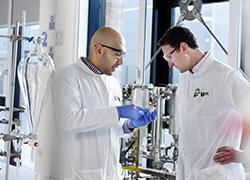Exploring the benefits of walking football for people with chronic breathlessness
Teesside University researchers are inviting local people with chronic breathlessness to take up walking football as a means of keeping active, improving health and having fun.
Callum Bradford, a research student at Teesside University, is investigating the benefits of walking football on those with chronic breathlessness as part of his PhD, in which he hopes to promote the activity as an effective rehabilitation option.
The walking football sessions are being delivered for local people who have been diagnosed with a breathing problem such as chronic obstructive pulmonary disease (COPD), allowing researchers to gain a better understanding of how the exercise supports them.
Callum said: “A lot of people with breathlessness do pulmonary rehabilitation, an exercise and education programme, for six weeks after diagnosis. The evidence behind that is brilliant; it improves exercise capacity and strength.
“Then, about twelve weeks after that, they’re back to square one again. We wanted to set up some kind of activity that they can carry on doing that’s really accessible, fun, social and safe.
“We’re going to have people come along to play walking football for six weeks, take measurements before and after, conduct some interviews and see how everyone finds it. We expect our work to highlight the benefits of walking football for people with chronic breathlessness with regards to quality of life, strength, exercise capacity and balance.”
Callum added: “We want people with chronic breathlessness to be comfortable attending an exercise class that works for them, where they can have a laugh while keeping active and improving their health. That’s why we’re running these walking football sessions, and we have already learned a lot about the benefits; everyone is really getting stuck in and enjoying themselves.”
Professor of Respiratory Rehabilitation Samantha Harrison, from Teesside University’s Centre for Rehabilitation, is overseeing the study alongside Dr Kirsti Loughran.
Professor Harrison joined Callum in emphasising the importance of participants having fun while exercising.
She added: “Pulmonary rehabilitation is really effective in reducing hospital admissions, reducing mortality and improving quality of life, but a lot of people don’t want to come and do an exercise programme in a hospital setting.
“The idea behind walking football within the community is that people want to engage with it more because it’s fun, engaging and quite nostalgic for a lot of them who used to play football, hockey or netball. It fits better into their everyday lives and still gets them being very physically active away from the seriousness of a medical facility.
We expect our work to highlight the benefits of walking football for people with chronic breathlessness with regards to quality of life, strength, exercise capacity and balance.
“The nice thing about it is all of them feel distracted from their breathlessness because they’re so engrossed in the game, which means that they’re able to exercise at a higher intensity.”
Members of Breathe Easy Darlington, a community of like-minded locals who all have breathing problems, are already taking part in the walking football sessions.
Gill Thomson, Joint Chair of Breathe Easy Darlington, said: “The Breathe Easy group is set up for people around Darlington and district with breathing problems. It’s free and we have socials, we have talks and we have once-a-week exercise classes.
“We try and do different things that everybody with breathing problems can enjoy. The walking football is good fun because the competitive side gets out with people.
“You can have a slight breathing difficulty, or you can be on oxygen, and your carer or a relative can come along with you. People who start coming love it.”
Helen Danks, who has been enjoying the walking football, said of her experience: “It’s a different form of exercise and you get to a point where you forget you’re exercising and you’re just going for it. It actually makes you do more.”
Callum’s PhD is supported by the National Institute for Health and Care Research (NIHR) Applied Research Collaboration (ARC) North East and North Cumbria (NENC) and sits within the ‘Integrating Physical Health, Mental Health and Social Care’ research theme, which is led by Teesside University’s Professor Denis Martin.
The researchers will recruit people from pulmonary rehabilitation programmes at North Tees and Hartlepool Hospitals NHS Foundation Trust and South Tees Hospitals Foundation Trust to take part in the walking football sessions moving forward, and they hope to establish open community sessions in the future.
 Supporting a circular economy for the biomanufacturing
...
Supporting a circular economy for the biomanufacturing
...